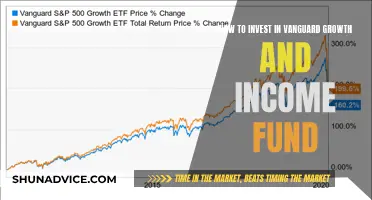
Index funds are a great way for beginners to start investing their money. They are a type of mutual fund or exchange-traded fund (ETF) that tracks a market index such as the S&P 500 or the Russell 2000. The fund's portfolio mirrors that of the chosen index, aiming to match its performance. Index funds are a passive investment option, meaning they are not actively managed by a fund manager. This keeps fees low, which is beneficial for investors.
Index funds are ideal for beginners because they are a low-cost, low-maintenance way to start investing. They also provide built-in diversification, as they track broad market indexes. This means that with a single fund, you can gain exposure to a wide range of securities, reducing the risk of losing money.
However, it's important to note that index funds have some drawbacks. One of the biggest trade-offs is that investors give up control over the specific stocks in their portfolio. Additionally, index funds may not be as diverse as expected, as they often invest more heavily in companies with higher market capitalisation.
Despite these shortcomings, index funds are a great option for those who are new to investing or who don't want to spend a lot of time actively managing their portfolios.
| Characteristics | Values |
|---|---|
| Type of investment vehicle | Mutual fund or exchange-traded fund (ETF) |
| Investment strategy | Match returns of a specific market index |
| Benefits | Diversify a portfolio, build wealth at a low cost |
| Indexes | S&P 500, Russell 2000, Nasdaq Composite, Dow Jones Industrial Average |
| Investment options | Brokerage account, mutual fund company, robo-advisor |
| Costs | Low fees, tax advantages, low risk |
| Ideal for | Beginners, long-term investors |
What You'll Learn

Understand the benefits of index funds
Index funds are a great way for beginners to start investing. Here are some of the benefits of investing in index funds:
Broad Diversification
Index funds are a type of investment vehicle that tracks a specific market index, such as the S&P 500 or the Russell 2000. They aim to match the performance of the index by holding a basket of securities in the same or similar proportion. Each index fund contains a preselected collection of hundreds or thousands of stocks, bonds, or both. This broad diversification helps to lower your overall investment risk. If a single stock or bond in the collection performs poorly, there's a good chance that another is performing well, minimising your losses.
Low Fees
Index funds are passively managed, meaning that investing decisions are based on trying to match the index. This passive management results in lower fees compared to active funds, which generally charge more for a manager to actively trade and analyse securities. These lower fees can make a big difference in your returns over time, especially with large balances.
Tax Efficiency
Index funds buy new lots of securities whenever investors put money into the fund, and they may have hundreds or thousands of lots to choose from when selling a particular security. This means they can sell the lots with the lowest capital gains and, therefore, the lowest tax. Index funds also tend to have lower turnover than actively managed funds, meaning they trigger fewer taxable events.
Simplicity
Index funds are simple to understand and invest in. You can clearly understand what you're investing in without having to do extensive research. They are also easy to invest in, as you can buy them directly through an index fund provider like Vanguard or Fidelity, or through other brokerage accounts and investment apps.
Strong Performance
Over the long term, index funds have consistently outperformed other types of funds in terms of total return. This is due to their low fees and lower transaction costs, as they hold investments until the index itself changes, which doesn't happen often.
In summary, index funds offer broad diversification, low fees, tax efficiency, simplicity, and strong performance, making them an attractive option for beginner investors.
Index Funds: Regular Investing for Long-Term Success
You may want to see also

Learn how to choose the right index fund
Index funds are a type of investment vehicle that tracks a market index, such as the S&P 500 or Nasdaq Composite. They are a passive form of investing, where the fund manager does not select the stocks the fund will invest in. Instead, the fund portfolio mirrors the index it tracks as closely as possible.
- Expense ratio: The expense ratio is the cost of running the index fund, and this value should be as low as possible. This is because index funds are passive investments, so a high expense ratio can eat into your returns.
- Assets under management (AUM): The size of the fund is measured by its AUM. If the AUM is too small, the fund expenses are split between fewer investors, making the fund more costly. Therefore, it is better to choose a fund with a higher AUM.
- Fund manager experience and performance: It is important to consider the experience and past performance of a fund manager before investing in an index fund. This can help reduce the tracking error, which is the deviation in the returns of the index fund from the returns of the index itself.
- Tracking error: The tracking error is the difference between the returns of the index fund and the returns of the index it is tracking. This should be as low as possible or, at the very least, consistently positive.
- Fit with your financial plan: Consider your financial goals, risk tolerance, and budget before choosing an index fund. For example, if you are close to retirement, you may prefer the stability of a bond index fund over a stock index fund.
- Liquidity and trading costs: Larger funds typically offer more liquidity and lower trading costs. However, it is important to compare the liquidity and trading costs of different funds to determine how easy it would be to liquidate your investment if needed.
- Tax-cost ratio: Mutual funds can lose some of their returns due to taxes. The tax-cost ratio, measured by Morningstar, tracks this percentage.
- Index fund provider: Consider whether the fund provider has other index funds that you may be interested in using in the future.
Overall, it is important to do your research and compare different index funds before making an investment decision.
A Guide to Investing in ICICI Mutual Funds
You may want to see also

Know the steps to start investing in index funds
Index funds are a great investment for building wealth over the long term. They are a low-cost, easy way to build wealth, and they are popular with retirement investors. Here are the steps to start investing in index funds:
- Have a goal for your index funds: Before investing in index funds, know what you want your money to do for you. Index funds are ideal if you're looking to let your money grow slowly over time, especially if you're saving for retirement.
- Research index funds: Look at the actual index funds you'll be investing in. When investigating an index fund, consider factors such as company size and capitalization, geography, business sector or industry, asset type, and market opportunities.
- Pick your index funds: Choose which corresponding index fund to buy. This often boils down to cost. Look for low-cost index funds that fit your investment objectives.
- Decide where to buy your index funds: You can purchase an index fund directly from a mutual fund company or a brokerage. Exchange-traded funds (ETFs) are like mini mutual funds that trade like stocks throughout the day. When choosing where to buy an index fund, consider fund selection, convenience, trading costs, impact investing, and commission-free options.
- Open an investment account: To purchase shares of an index fund, you'll need to open an investment account. A brokerage account, individual retirement account (IRA), or Roth IRA will all work.
- Buy the fund: When purchasing the fund, you may be able to select a fixed dollar amount to spend or choose a number of shares. The share price of the index fund and your investing budget will determine how much you're willing to spend.
- Keep an eye on your index funds: Index funds are considered a passive management strategy, so you don't need to actively decide which investments to buy or sell. However, you should still monitor your index fund to ensure it's doing its job and mirroring the performance of the underlying index.
A Beginner's Guide to Scottrade Mutual Funds
You may want to see also

Be aware of the advantages and disadvantages of index funds
Index funds are a type of investment vehicle that tracks a market index, such as the S&P 500 or the NASDAQ Composite. They are designed to match the investment results of a specific market index and can include stocks or bonds in their portfolio.
Advantages of Index Funds
Index funds offer a range of benefits to investors:
- Low fees and costs: Index funds are passively managed, meaning they are not actively traded and do not require fund managers to spend time and money researching stocks. This results in lower fees and costs for investors.
- Tax advantages: Due to their passive management, index funds have very low turnover, resulting in fewer trades placed by managers. This generates fewer capital gains distributions that are passed on to shareholders, improving tax efficiency.
- Broad diversification: Index funds offer exposure to a large number of holdings, often investing in hundreds or thousands of securities. This diversification reduces the relative market risk and protects against deep losses.
- Low risk: Index funds are relatively low-risk options for investing in stocks and bonds due to their inherent diversification.
- Better performance: Academic studies have shown that index funds tend to outperform actively managed funds over time.
- Simplicity: Index funds are simple and easy to invest in, making them a good choice for beginners.
Disadvantages of Index Funds
Despite their advantages, index funds also have some drawbacks:
- Lack of flexibility: Index funds must follow policies and strategies that require them to perform in line with their chosen index, limiting their flexibility compared to actively managed funds.
- No big gains: Index funds are designed to match the market's performance, so they do not offer the potential for massive gains that managed funds can provide.
- Underperformance: Index funds may underperform their benchmark index due to fees and expenses.
- Volatility: Index funds can be volatile, especially when the economy or stock market is not performing well.
- Limited control: Investors in index funds do not have the opportunity to beat the market or prove their mettle as superior investors.
Unlocking Private Equity Fund Investment: A Guide
You may want to see also

Compare index funds with other investment options
Index funds are a type of investment vehicle that aims to match the returns of a specific market index, such as the S&P 500 or the Russell 2000. They are passively managed, meaning that investment decisions are based on trying to match the index, rather than trying to beat it. This makes them a low-cost investment option, with lower fees than actively managed funds.
Index funds are often compared to mutual funds and exchange-traded funds (ETFs). Mutual funds are actively managed, meaning that a fund manager will try to beat the market by actively trading and selecting stocks. This makes them more expensive than index funds, as there are higher fees and trading expenses. ETFs, on the other hand, are similar to index funds in that they are often passively managed and have lower fees. However, ETFs trade like stocks throughout the day, while index funds are bought and sold like mutual funds.
Another investment option to consider is individual stocks. Buying individual stocks can be riskier than investing in a diversified fund like an index fund, but it also offers the potential for higher returns. Additionally, some index funds may not be as diversified as others, and it's important to carefully research the holdings of an index fund before investing.
Overall, index funds offer a simple, low-cost way to invest, making them a good option for beginners. They provide broad market exposure or exposure to a specific sector, and they tend to outperform actively managed funds over the long run.
Invest in HDFC Mutual Fund: Secure Your Future
You may want to see also
Frequently asked questions
An index fund is a type of investment vehicle that tracks a market index, such as the S&P 500 or the Russell 2000. Index funds are passively managed, meaning they aim to match the performance of the index rather than beat it. They are a good choice for beginners because they are simple, low-cost and provide instant diversification.
When choosing an index fund, consider your financial goals, risk tolerance and budget. Also, research the fees and performance of different funds. Some popular index funds include the Vanguard S&P 500 ETF and the iShares Core S&P Small-Cap ETF.
You can buy shares in an index fund through a brokerage account or directly from an index fund provider, such as Vanguard or Fidelity. You will need to decide how much to invest and whether to make a market or limit order.
Advantages include low fees, built-in diversification, minimal maintenance and tax efficiency. Disadvantages include not being able to select stocks in the index and potentially being less diverse than expected, as they often invest more in larger companies.







